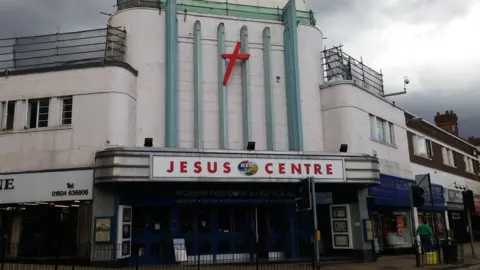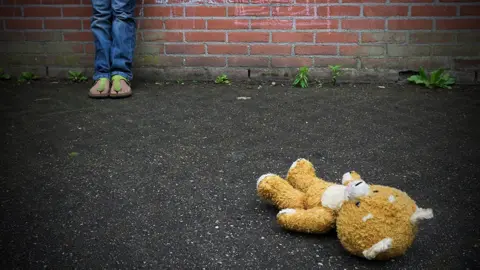Jesus Army churches close after child sex abuse claims
 BBC
BBCAn orthodox evangelical church has closed down following a series of historical cases of sexual abuse.
Six men from the Jesus Fellowship Church - formerly known as the Jesus Army - have so far been sentenced for the indecent and sexual assault of 11 victims between the 1970s and 1990s.
Northamptonshire Police said about 200 complaints of various types of abuse were made. Its investigations continue.
The JFC said it was "appalled" by the abuse and apologised to those affected.
A lawyer representing two alleged victims said he was concerned the closures may mean his clients do not receive compensation.
The JFC's leadership team said members of the church voted to revoke its constitution at a meeting on Sunday.
The vote came years after the first allegations of bullying and financial, physical and sexual abuse were made, the group said.
At its peak in the early 2000s, Jesus Army had about 2,500 members - hundreds of whom lived together in community houses.
Membership dropped to less than 1,000 people after the abuse claims were made in 2013, following the JFC's invitation to worshippers to share their experiences of the church.
The JFC passed on the reports to police in Northamptonshire - where the church was based - and an investigation known as Operation Lifeboat was launched.
'Cult'
Solicitor David Greenwood is representing two women from the area who say they were abused - one sexually and the other emotionally - by members of the church when they were teenagers.
He said the church's "totalitarian regime" meant child members were not allowed possessions, had to attend schools directed by the organisation, and were even only "parented" by people the church's "elders" deemed appropriate.
"I would classify it as a cult in as much as children were [taught] to be completely obedient to the rules made up by its sole leader, Noel Stanton," he told BBC News.
Neither of Mr Greenwood's clients' claims concern Mr Stanton, who died in 2009.
Mr Greenwood, from Switalskis solicitors, said he was aware of about 30 alleged victims of either emotional or sexual abuse, including at least one outside of the Northamptonshire area.
 Getty Images
Getty ImagesMr Greenwood told BBC News it was "concerning" that the church's numerous trusts might make it difficult for victims to access compensation once the organisation no longer exists.
"We need to know exactly how any money from these trusts can be accessed... All that is just uncertain. We would like a bit more transparency," he added.
Northamptonshire Police said it launched a second "highly complex" investigation in March this year because of "new lines of enquiry".
The JFC said in a statement that news of the abuse had left current members of the church "profoundly shaken" and the organisation's reputation had been "badly damaged".
The leadership team added the decline in membership to less than 1,000 people has led to fewer donations so the organisation "no longer has the resources to continue as it was".

Analysis
By Martin Bashir, BBC religion editor
The decision to disband is clearly an acknowledgement of serious wrongdoing but also a recognition that religious organisations, led by charismatic individuals, can easily lead to the most appalling abuse unless they are properly managed and held accountable.
Indeed, these organisations are often chosen by predators as places where it is possible to get away with the abuse of children.
The ongoing Independent Inquiry into Child Sexual Abuse has repeatedly uncovered religious communities and para-church organisations that have failed to embrace statutory standards for the safeguarding of children and vulnerable adults.

The church said it was "deeply sorry for, and appalled by, the abuse that has taken place" within its organisation.
It apologised to those affected, adding: "Children and vulnerable people were entitled to expect full protection from harm... as things have become clearer to us, we are grieved and deeply troubled."
Congregations that were part of the JFC in Birmingham, Brighton, Coventry, Kettering, Leicester, London, Northampton, Norwich, Oxford and Sheffield will become fully independent, the leadership team said.
Update 29 May 2019: This article has been amended to reflect new membership data provided by the JFC.
